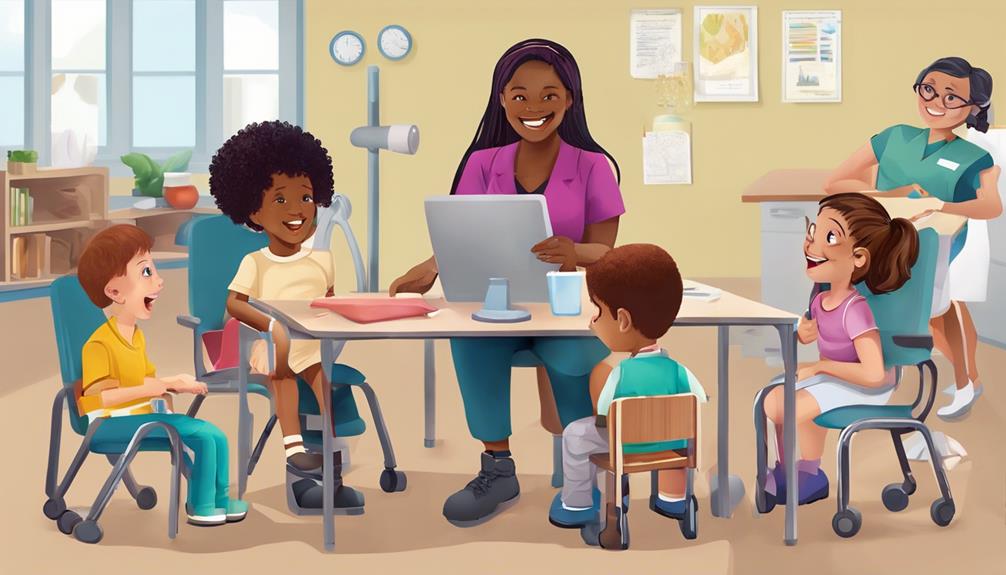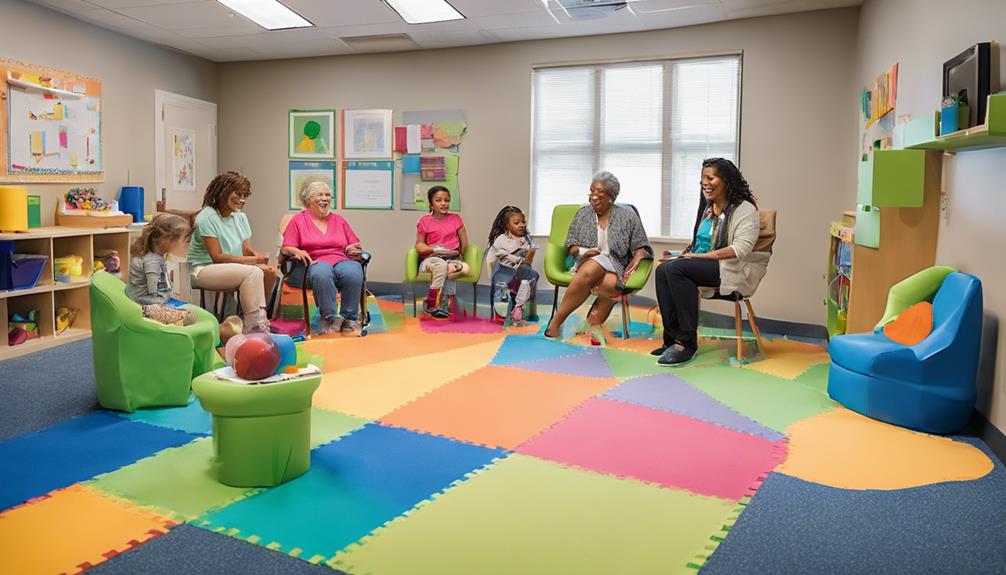When delving into the realm of speech therapy, it becomes apparent that approximately one in every twelve children in the United States will require speech therapy assistance during their time in school.
Exploring the intricacies of speech therapy services can provide valuable insights into the diverse approaches available to support individuals in their communication journey.
Whether you're a parent seeking assistance for your child or a professional in the field, understanding the nuances of speech therapy options near you could prove to be a pivotal step in enhancing communication skills and fostering growth.
Key Takeaways
- Speech therapy enhances communication skills and quality of life for children in need.
- Professional speech-language pathologists offer personalized treatment plans tailored to individual needs.
- Early intervention with certified therapists leads to improved communication skills and prevents challenges.
- Collaboration with speech therapists and support systems ensures successful outcomes and progress tracking.
Benefits of Speech Therapy
Speech therapy offers individuals of all ages the opportunity to enhance their communication skills and improve their overall quality of life. In the Houston area, speech-language pathologists work closely with clients to develop personalized treatment plans tailored to their specific needs and goals. These professionals utilize evidence-based approaches to address a wide range of speech, language, and social/play skills, as well as fluency and myofunctional therapy. By collaborating with speech therapists, individuals can experience increased engagement and independence, particularly in children with developmental communication disorders.
Moreover, speech therapy services extend beyond basic communication skills to encompass voice treatment, stuttering therapy, and accent modification training. This comprehensive care ensures that individuals receive holistic support to address various aspects of their communication challenges. Whether it's improving articulation, enhancing social interactions, or refining vocal quality, speech therapy plays a crucial role in empowering individuals to express themselves effectively and confidently.
Understanding Speech Disorders

As we explore the topic of understanding speech disorders, it's crucial to grasp the causes, types, and treatment options available.
Speech disorders can stem from various factors such as neurological conditions, developmental delays, or physical impairments.
Causes of Speech Disorders
Understanding the underlying factors that contribute to speech disorders is essential for developing targeted and effective treatment strategies. Speech disorders can stem from a variety of sources, including:
- Neurological conditions
- Genetic predispositions
- Developmental delays
- Traumatic brain injuries
- Strokes
- Physical abnormalities in the mouth or throat
Environmental influences like exposure to toxins, substance abuse during pregnancy, or a lack of early speech stimulation can also play a role in speech difficulties. Additionally, medical conditions such as cerebral palsy, autism spectrum disorders, and hearing loss are associated with speech disorders.
Identifying the specific cause of a speech disorder is crucial for creating personalized treatment plans that address the individual's unique needs. By recognizing these diverse causes, speech therapists can provide tailored interventions to help individuals improve their speech and language skills effectively.
Types of Speech Disorders
Exploring the various types of speech disorders provides a comprehensive understanding of the challenges individuals may face in communication. These disorders encompass articulation issues, fluency disruptions, voice irregularities, and language impairments.
Articulation disorders manifest as difficulties in pronouncing sounds accurately, while fluency disorders, like stuttering, interrupt the natural flow of speech. Voice disorders can alter pitch, volume, or quality of the voice, while language disorders hinder word comprehension and usage within context.
Identifying the specific type of speech disorder is vital for tailoring effective treatment plans to meet individual needs. Speech-language pathologists are instrumental in evaluating, diagnosing, and treating diverse speech disorders to enhance communication abilities.
Understanding these distinctions enables targeted interventions to support individuals on their journey towards improved communication skills.
Treatment Options Available
In our practice, we aim to provide a range of effective treatment options for individuals facing various speech disorders, tailored to meet their unique needs and goals.
Our certified speech-language pathologists offer bilingual evaluations and therapy services in Spanish to address diverse linguistic needs.
Therapy sessions focus on promoting independence, community success, and enhancing communication skills. We personalize care to ensure effective outcomes, encompassing voice treatment, stuttering therapy, and accent modification training to meet specific requirements.
Importance of Early Intervention

We understand the significance of early intervention in speech therapy for children with communication challenges.
By starting therapy early, we can observe improvements in speech and language skills more effectively.
Engaging families in the therapy process can enhance the overall outcomes for the child.
Early Intervention Benefits
When seeking early intervention in speech therapy, one can expect to witness significant improvements in communication skills development, leading to better outcomes and faster progress. Research supports the idea that children who receive early intervention for speech delays often show enhanced language abilities and improved social interactions.
By addressing speech and language difficulties early on, we can help prevent potential academic, social, and emotional challenges later in the child's life. Early identification and treatment of speech disorders play a crucial role in enhancing a child's overall quality of life and boosting their confidence.
Collaborating with speech therapists in early intervention programs can have a profound positive impact on a child's speech and language development journey, setting a strong foundation for their future communication skills.
Developmental Milestones Tracking
Detecting speech and language delays as early as 12 months old through developmental milestones tracking is crucial for effective early intervention and improved treatment outcomes. Monitoring a child's developmental progress can provide valuable insights into their speech and language development.
Here are three key points highlighting the importance of developmental milestones tracking:
- Early Identification: Tracking milestones such as babbling, first words, and sentence formation can help identify potential delays early on.
- Prevention of Long-Term Challenges: Early intervention through milestone tracking can prevent long-term communication difficulties and support overall development.
- Timely Access to Services: Prompt identification of delays allows for timely access to speech therapy services, enhancing communication skills development.
Family Involvement Strategies
Understanding the critical role of family involvement in speech therapy sets the foundation for optimal outcomes in children with communication disorders. Engaging families in therapy sessions not only helps them comprehend their child's progress but also equips them to support it. By providing families with education and strategies, we empower them to continue nurturing their child's communication development at home.
Collaborating with families in goal-setting and treatment planning significantly enhances the effectiveness of speech therapy interventions. Research underscores that involving families in therapy leads to a higher carryover of skills beyond the therapy setting. Early intervention through family involvement is key to unlocking a child's full potential in overcoming communication challenges.
Together, we can make a difference in a child's journey to improved communication skills.
Types of Speech Therapy Techniques

Navigating the world of speech therapy techniques can be overwhelming, but understanding the different approaches available can help individuals find the right path to improving their communication skills.
When seeking speech therapy, it's essential to be aware of the diverse techniques therapists may use:
- Articulation Therapy: This technique focuses on improving the pronunciation of speech sounds, helping individuals speak more clearly and effectively.
- Language Intervention: Targeting communication and comprehension skills, this approach assists individuals in expressing themselves better and understanding language cues.
- Fluency Therapy: Designed to enhance the flow and rhythm of speech, especially for those struggling with stuttering, this technique aims to make speech more smooth and effortless.
Qualifications of Speech Therapists

As speech therapists, we understand the importance of earning the necessary credentials to provide quality care.
These professionals undergo specialized training, holding master's degrees and completing supervised fellowships to ensure they meet stringent requirements.
Therapist Credentials Importance
When exploring speech therapy options, the qualifications of speech therapists play a pivotal role in ensuring effective treatment for speech disorders. Here are three key reasons why therapist credentials are important:
- Expertise and Qualifications: Advanced degrees, certifications, and specialized training signify a therapist's dedication to the field and staying up-to-date with the latest practices.
- Licensing and Certifications: It's essential to choose therapists who are licensed by the state and hold certifications from reputable organizations like ASHA to guarantee a high standard of care.
- Experience and Specialization: Evaluating a therapist's experience with diverse clients and their specialized training, such as in childhood apraxia of speech, can significantly impact the effectiveness of the treatment provided.
Specialized Training Requirements
Specialized training requirements for speech therapists, particularly those focusing on apraxia of speech, encompass a Master's degree in Speech-Language Pathology as a foundational qualification. In addition to academic credentials, completing clinical practicum hours under the supervision of a licensed SLP is essential. Specialized training may include courses in motor speech disorders, language development, and advanced assessment techniques. Certification by the American Speech-Language-Hearing Association (ASHA) is a common qualification for speech therapists specializing in apraxia of speech. Continuous professional development through ongoing education is crucial to stay updated and proficient in treating apraxia of speech.
| Training Requirement | Description |
|---|---|
| Master's Degree | Foundational qualification in Speech-Language Pathology |
| Clinical Practicum | Hands-on experience supervised by a licensed SLP |
| Specialized Courses | Motor speech disorders, language development, advanced assessments |
| ASHA Certification | Recognized qualification for speech therapists |
Finding Speech Therapy Providers

To find reliable speech therapy providers near you, consider utilizing ASHA ProFind, a platform connecting individuals with over 20,000 ASHA-Certified audiologists and speech-language pathologists who are currently accepting referrals and providing tailored guidance for your specific needs. When searching for the right speech therapy provider, keep the following points in mind:
- Wide Network: ASHA ProFind offers access to a vast network of over 20,000 ASHA-Certified professionals, ensuring you have a range of options to choose from.
- Accessibility: Professionals listed on ASHA ProFind are actively accepting referrals, making it easier for you to connect with a speech therapist promptly.
- Tailored Guidance: ASHA ProFind provides personalized guidance to help you identify the most suitable professional based on your specific requirements, ensuring you receive the care you need.
Evaluating Speech Therapy Services

As we delve into evaluating speech therapy services, it's crucial to prioritize assessing the provider's experience, qualifications, and specialization in treating speech disorders. Look for a provider who's a proven track record in helping individuals with speech challenges similar to yours. Consider the range of services offered, including assessments, personalized treatment plans, and follow-up care for comprehensive support throughout your therapy journey. It's essential to seek evidence-based approaches that have shown success in improving communication skills both in children and adults.
Additionally, evaluate if the provider offers specialized services such as bilingual evaluations, accent modification training, and tailored therapy to meet individual needs. This personalized approach can lead to more successful outcomes. Ensure the speech therapy provider accepts a variety of insurance plans, provides convenient scheduling options, and maintains a commitment to delivering high-quality, personalized therapy services. By prioritizing these factors, you can make an informed decision when selecting a speech therapy provider that best fits your needs and goals.
Cost of Speech Therapy Sessions

Understanding the varying costs associated with speech therapy sessions is essential for individuals seeking this specialized form of care. When considering the cost of speech therapy, it's important to keep in mind the following key points:
- Factors influencing cost: The cost of speech therapy sessions can fluctuate based on factors such as location, provider expertise, and the specific type of therapy required.
- Private pay rates: Typically, private pay rates for speech therapy sessions range from $75 to $150 per hour. These rates may vary depending on the provider and the geographical area.
- Financial assistance options: Some clinics or therapy centers may offer discounted rates or sliding scale fees based on financial need. Additionally, schools and early intervention programs may provide speech therapy services at no cost to eligible students, offering a more affordable option for those in need of therapy services.
Navigating the costs associated with speech therapy can be overwhelming, but exploring these options can help individuals find a solution that fits their financial circumstances.
Insurance Coverage for Speech Therapy

Navigating insurance coverage for speech therapy services can be a crucial step in accessing necessary treatment without financial strain. Many insurance plans, such as Blue Cross Blue Shield, United Healthcare, and Medicare, typically cover speech therapy. However, it's important to keep in mind that coverage may vary depending on the individual's plan and specific needs.
To fully grasp the extent of your coverage for speech therapy, reaching out to your insurance provider is essential. Some plans might necessitate pre-authorization or a referral from your primary care physician before beginning speech therapy services. Understanding the details of your insurance coverage for speech therapy can significantly aid in planning and accessing the required treatment without shouldering excessive financial burdens.
Progress Tracking and Goal Setting

Exploring the path to improved speech through setting goals and tracking progress is key in speech therapy. It allows us to tailor our approach to meet the unique needs of each client effectively.
Here's how we make progress tracking and goal setting work for you:
- Personalized Goals: We work together to establish specific, measurable, achievable, relevant, and time-bound objectives that align with your aspirations and abilities.
- Data-Driven Progress: By collecting and analyzing data points like accuracy percentages, error types, and speech intelligibility, we can objectively measure your advancements over time.
- Celebrating Achievements: Tracking your progress not only helps us adjust interventions as needed but also allows us to celebrate your successes along the way, motivating you to keep striving for improvement.
With these tools in place, we can navigate your speech therapy journey with clarity, purpose, and a clear roadmap towards your communication goals.
Support Systems for Speech Therapy Success

Support systems play a crucial role in the success of speech therapy by providing a foundation of guidance and encouragement for individuals on their communication journey.
Involving family members in therapy sessions can create a supportive environment where practice can continue outside of formal sessions.
Collaborating with teachers and school staff ensures consistency in implementing strategies across different settings, reinforcing progress made in therapy.
Technology and online resources offer valuable tools for practicing skills and tracking improvement between sessions.
Support groups for parents and caregivers provide emotional reassurance and practical advice, fostering a sense of community and shared experiences.
Regular communication between speech therapists and other healthcare professionals guarantees a comprehensive approach to support, addressing any underlying issues that may impact speech therapy progress.
Frequently Asked Questions
How Do I Choose a Good Speech Therapist?
When choosing a good speech therapist, it's crucial to consider their experience, expertise, and personalized treatment plans.
Look for certifications like ASHA for speech-language pathologists and seek recommendations from trusted sources.
Evaluate their communication style and ability to create a supportive therapy environment.
A therapist who meets these criteria can provide the best care for your needs and help you achieve your speech therapy goals.
How Do I Find a Good Speech and Language Therapist?
When searching for a good speech and language therapist, consider their specialization, experience, certifications, and recommendations from trusted sources. Look for therapists who've worked with individuals facing similar challenges and hold relevant credentials.
Online directories like ASHA ProFind can help connect you with qualified speech-language pathologists in your area. These steps will guide you to find the right therapist for your needs.
How Much Does Private Speech and Language Therapy Cost?
Private speech and language therapy costs can vary, typically ranging from $100 to $250 per session. Some therapists offer discounted rates or payment plans based on income. Insurance coverage or funding programs may help offset expenses.
Additional costs like assessments, materials, and travel should be considered. It's wise to inquire about payment options and financial aid when exploring private therapy.
How Do I Get a Referral to a Speech and Language Therapist?
We usually start by reaching out to our primary care physician or pediatrician for a referral to a speech and language therapist. Educators, school counselors, and other healthcare professionals can also provide valuable recommendations. Checking with our insurance provider helps determine if a referral is necessary. Seeking guidance from local support groups, online forums, or organizations like Apraxia Kids can also lead us in the right direction.
Conclusion
In conclusion, finding the right speech therapy services can make a significant difference in the lives of children and adolescents with communication disorders.
Did you know that early intervention can lead to a 70-80% improvement in communication skills?
With the right support, guidance, and resources, individuals can reach their full potential and improve their quality of life.
Don't hesitate to seek out speech therapy services near you to help your loved ones thrive.











